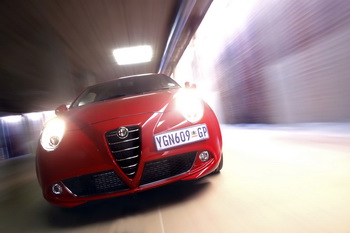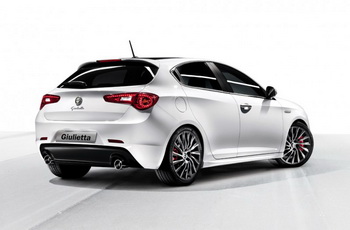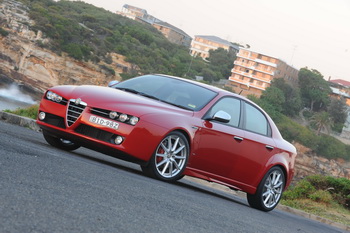

 |
|
The Alfa MiTo
(top) has seen its range broadened
considerably in recent weeks by the arrival
of LPG and 1.3 Multijet versions; the new
Giulietta (middle) was officially previewed
yesterday, while the
Alfa 159 (bottom) saw its Italian market sales
dramatically slide last month. |
|
|
|
Alfa Romeo has all but
vanished from sight over the last year, leaving
enthusiasts of the brand to speculate on its
future. In particular, its complete absence from
the exhaustive Chrysler Group presentation
earlier surprised many watchers. It failed to
find its way into the six hours of presentations
and a myriad of slides, despite its return being
a core aim of Fiat’s original intention to
return Stateside. However, the famous carmaker
from Milan is currently deadlocked into two
proposed future directions, and neither camp has
yet convinced Fiat CEO Sergio Marchionne that a
viable game plan is on the table.
This week
Marchionne brought the Alfa Romeo situation into the public
eye by openly questioning its future strategy, with the
timing surprising onlookers as his comments in an interview
on Tuesday overshadowed the official preview of the new Alfa
Romeo Giulietta yesterday. "We
need to work a lot harder on Alfa to make an intelligent
decision that effectively preserves the highest possible
value to Fiat," Marchionne told Automotive News Europe
in an interview.
Early last year, one of the Fiat Group’s
rising young stars, Luca De Meo, was handed responsibility
for the division following the departure of Antonio
Baravalle. But after overseeing a refit of the long-time
Pomigliano d’Arco factory near Naples, De Meo jumped ship to
become marketing chief at VW Group, in turn handing the
reigns to Sergio Cravero. There has been very little sign of
a long-term focus and marketing has been virtually
non-existent over the last year. Some focus has been placed
on widening the range (the MiTo has seen its appeal
broadened in recent weeks by the arrival of new 1.3 MultiJet
and LPG versions), but a MiTo GTA project, more in line with
traditional brand thinking, has been placed on hold for the
time being.
The deal with Chrysler, which is set to
change the face of the Fiat Group’s future, initially came
into play after Marchionne was casting around the ‘Big 3’ in
Detroit to find excess capacity to produce Alfa Romeo models
in the U.S. (along with a proposed US launch of Fiat’s Iveco
trucks-and-buses unit). The unfolding alliance with Chrysler
overtook events for the Milanese brand, but initially Alfa
Romeo was a key part in the plans, and earlier this month
there was surprise when the it was left out of the
presentation. An exhaustive study carried out by JD Power &
Associates, focused around the current 159 sedan and
Sportwagon, Brera and Spider, concluded that these were not
the right cars to retail in the US, while a deal signed with
BMW that would have seen the MiTo sold in selected MINI
dealers was overtaken by the new scenario at Chrysler.
Marchionne surprised onlookers at the Detroit presentation
when he made it clear that Fiat does not
now harbour any concrete plans as to when to take Alfa Romeo back to the US.
Earlier this autumn, meanwhile, it was
revealed that Alfa Romeo would be tied together the Chrysler
Group’s Dodge brand. Little has unfolded from this
announcement, however, while a second tie-up between the
Chrysler brand and Lancia has been signed off and is
proceeding at full pace with a raft of joint models and
marketing in the pipeline. While the Chrysler-Lancia tie-up
has much logic to it and complementary synergies, this is
not the case when comparing Dodge to Alfa Romeo, with the
two brands sharing little in common.
In Detroit, Marchionne said he was not
convinced by Alfa Romeo’s plans, and this went to the heart
of the matter. Since Fiat Group bought Alfa Romeo 23 years
ago, initially to stop would-be suitor Ford from gaining
access to its factory in the pre-EU closed market days, the
Milanese brand has had much money lavished on it, without
payback in terms of volumes, while sister niche brand Lancia
has been forced off its natural ground to make room and
pushed into the background. Successive models have failed to
live up to commercial expectations and after green-lighting
a raft of new models that were in the pipeline when he
arrived, as well as the Fiat Grande Punto-based MiTo,
Marchionne is not keen to keep indulging the brand without a
clear focus and strategy that can bring profits.
Two distinct camps have emerged at Alfa
Romeo. One foresees the brand developing in the traditional
way, true to its historic roots, following tradition in the
manner of Ferrari and Maserati. The second group, meanwhile,
forsees a future Alfa Romeo chasing volume – fun and sporty,
but more attuned to the shape of the current global car
market. While the traditionalists hold much power, the
constant refrain of positioning Alfa against the prestige
German brands – BMW in particular – has never paid off, and
is an even less promising route given such marques’ heavy
exposure to the global economic downturn. In his interview
with ANE this week Marchionne said he was tired of
the continual repositioning against different targets.
"We need to stop doing it," he said. "You cannot be a
newborn Christian every four years. It's the same religion,
eventually you need to own a religion and carry it to
conclusion."
Much will depend
on the market’s reception to the next product in the
pipeline, the vital new C-segment Giulietta which will
replace the Alfa 147 in the showrooms early next year. With
Marchionne working on a new industrial plan for Italy to
follow the Chrysler five-year plan, the future direction of
Alfa Romeo should edge into the daylight.
|